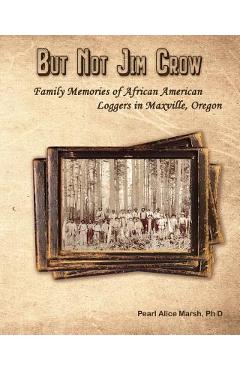But Not Jim Crow: Family Memories of African American Loggers of Maxville, Oregon - Pearl Alice Marsh

Detalii But Not Jim Crow: Family
libris.ro
148.8 Lei
186 Lei
History
Pearl Alice Marsh
But Not Jim Crow: Family - Disponibil la libris.ro
Pe YEO găsești But Not Jim Crow: Family de la Pearl Alice Marsh, în categoria History.
Indiferent de nevoile tale, But Not Jim Crow: Family Memories of African American Loggers of Maxville, Oregon - Pearl Alice Marsh din categoria History îți poate aduce un echilibru perfect între calitate și preț, cu avantaje practice și moderne.
Preț: 148.8 Lei
Caracteristicile produsului But Not Jim Crow: Family
Comandă But Not Jim Crow: Family Online, Simplu și Rapid
Prin intermediul platformei YEO, poți comanda But Not Jim Crow: Family de la libris.ro rapid și în siguranță. Bucură-te de o experiență de cumpărături online optimizată și descoperă cele mai bune oferte actualizate constant.
Descriere magazin:
This particular Oregon history is about African-American loggers during the Great Migration of more than six million African Americans from the Jim Crow south to the north. It is a community history and the history of families, a history from below. This particular Oregon history is about African American loggers during the Great Migration of more than six million African Americans from the Jim Crow south to the north. It is a community history and the history of families, a history from below. . It is stored, coded, and recalled in the memories of two generations as they descended from the original families. It is a fragile history passed orally from generation to generation and often is lost. It is not documented in books, the pages of mainstream newspapers, nor preserved in archival collections of photographs. Thus, this book was conceived as part of a memory project to recover and reconstruct the history of a rural community of African American loggers from memories of their aging descendants. These loggers and their families came to a railroad logging town, Maxville, Wallowa County, Oregon, between 1923 and the 1940s, The memory project was based upon the interpretive authority of ordinary people, thus giving power to the fragments and short memories of individuals to tell a community\'s story. The personal stories were contextualized through extensive research using historical newspapers, public records, census records, oral intrviews, and the recorded memories of others.

Produse asemănătoare
Produse marca Pearl Alice Marsh

But Not Jim Crow: Family Memories of African American Loggers of Maxville, Oregon - Pearl Alice Marsh
![]() libris.ro
libris.ro
Actualizat in 15/12/2024
148.8 Lei